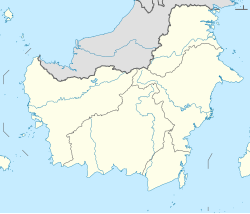Seruyan River
| Pembuang River Sungai Seruyan, Soengai Saroejan, Soengai Pemboeang, Soengai Seroejan | |
|---|---|
 Pembuang River mouth | |
| Native name | Sungai Pembuang (Indonesian) |
| Location | |
| Country | Indonesia |
| Province | Central Kalimantan |
| Physical characteristics | |
| Source | |
| • location | Bikit Tikung, Schwaner Mountain Range |
| Mouth | |
• location | Java Sea |
• coordinates | 3°22′40.87″S 112°32′25.86″E / 3.3780194°S 112.5405167°E |
| Length | 350 km (220 mi) |
| Basin size | 12,911 km2 (4,985 sq mi)[1] |
| Discharge | |
| • location | Java Sea (near mouth) |
| • average | 1,216 m3/s (42,900 cu ft/s) |
| Discharge | |
| • location | Pembuang (Basin size: 7,554 km2 (2,917 sq mi)[2] |
| • average | 723 m3/s (25,500 cu ft/s)[3] |
Pembuang River or Seruyan River is a river of Borneo, Indonesia.[4] The river has its source near Bikit Tikung (1,175 metres) in the Schwaner Mountain Range.[5] The eastern side of the river contains dense forest down to Sembulu (Belajau) lakes and is said to be a major habitat of the orangutan.[5] Pembuang means "place of rejection".[6]
Geography
[edit]The river flows in the middle to the south of Borneo island with predominantly tropical rainforest climate (designated as Af in the Köppen-Geiger climate classification).[7] The annual average temperature in the area is 24 °C. The warmest month is November, when the average temperature is around 26 °C, and the coldest is February, at 23 °C.[8] The average annual rainfall is 3118 (2971-3480) mm. The wettest month is December, with an average of 491 mm rainfall, and the driest is September, with 67 mm rainfall.[9]
Hydrology
[edit]The Seruyan River (previously named Seroejan) is a river that crosses and flows in the Seruyan Regency, Central Kalimantan province, Indonesia. The river flows from north to south and empties into the Java Sea has a length of 350 Km and a navigable 300 Km through several cities, an average depth of 6 m and an average width of 300 m.
A number of its tributaries:
• Sembuluh Lake River
• Salau River
• Pukun River
• Kalua River
• Lanan River
• Bai River
See also
[edit]References
[edit]- ^ Daniel, Stapper (2011). "Artisanal Gold Mining, Mercury and Sediment in Central Kalimantan, Indonesia" (PDF).
- ^ Daniel, Stapper (2011). "Artisanal Gold Mining, Mercury and Sediment in Central Kalimantan, Indonesia" (PDF).
- ^ Daniel, Stapper (2011). "Artisanal Gold Mining, Mercury and Sediment in Central Kalimantan, Indonesia" (PDF).
- ^ Sungai Pembuang at Geonames.org (cc-by); Last updated 2012-01-17; Database dump downloaded 2015-11-27
- ^ a b Rijksen, H. D.; Meijaard, E. (1999). Our vanishing relative: the status of wild orang-utans at the close of the twentieth century. Springer. pp. 212–3. ISBN 0-7923-5754-X.
- ^ Hikajat Bandjar: A study in Malay historiography. Bibliotheca Indonesica, Koninklijk Instituut voor Taal-, Land- en Volkenkunde (Netherlands), Martinus Nijhoff. 1968.
- ^ Peel, M C; Finlayson, B L; McMahon, T A (2007). "Updated world map of the Köppen-Geiger climate classification". Hydrology and Earth System Sciences. 11 (5): 1633–1644. doi:10.5194/hess-11-1633-2007.
- ^ "NASA Earth Observations Data Set Index". NASA. 30 January 2016.
- ^ "NASA Earth Observations: Rainfall (1 month - TRMM)". NASA/Tropical Rainfall Monitoring Mission. 30 January 2016.


